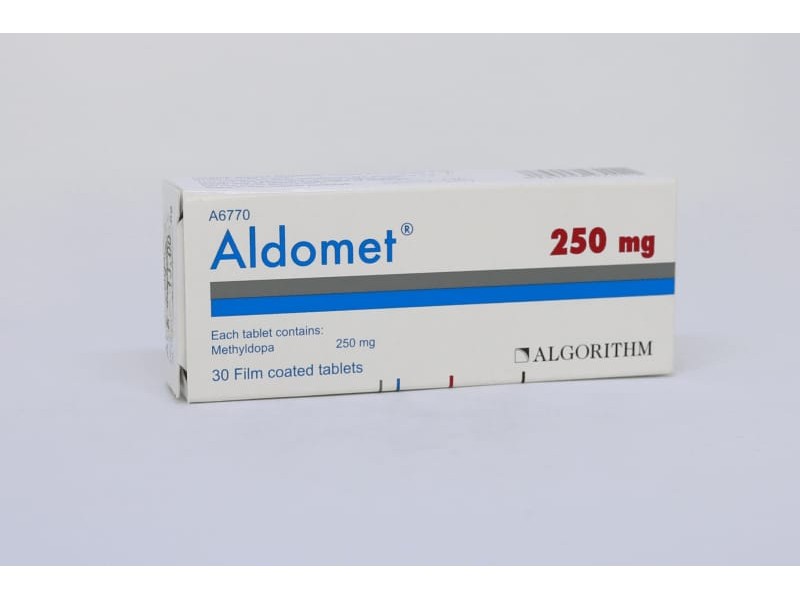
Out Of Stock
- It is indicated in the treatment essential hypertension
- High blood pressure is a common condition in which the long-term force of the blood against your artery walls is high enough that it may eventually cause health problems, such as heart disease.
- Lowering blood pressure reduces the risk of fatal and nonfatal cardiovascular events, primarily strokes and myocardial infarctions.
Method Of Administration Of Aldomet 250 Mg Tablets
- Swallow the tablets whole with a glass of water or other liquid
- Take your medicine at about the same time each day, unless your doctor tells you otherwise.
- It does not matter whether you take Aldomet before or after food.
- Your doctor will tell you how many tablets you need to take each day. This depends on your condition and whether you are taking any other medicines.
- If you are taking it twice a day, take the tablets at breakfast time and dinner time, that is about 12 hours apart.
- If you are taking it three times a day, take the tablets about 8 hours apart.
- Doses may be changed in special conditions so always follow your doctor's or pharmacist's instructions.
- If you take more than you should, talk to a doctor or go to the hospital straight away.
- If you forget to take a dose, take it as soon as you remember it unless it is nearly time for your next dose.
- Do not take a double dose (two doses at the same time) to make up for the forgotten dose.
Undesirable Side Effects Of Aldomet 250 Mg Tablets
- Although the following side effects are not common in everyone, some patients may complain from:
- Dizziness
- Light-headedness
- Drowsiness
- Weakness.
Pregnancy & Breastfeeding Precautions While Taking Aldomet 250 Mg Tablets
- If you are pregnant or breastfeeding, think you may be pregnant or are planning to have a baby, ask your doctor or pharmacist for advice before taking this medicine.
- Your doctor will discuss the possible risks and benefits of using this medicine during pregnancy and breast-feeding
Non-Pharmacological Treatments & Advice To Reduce Blood Pressure
- To measure blood pressure correctly:
- Don’t eat or drink anything 30 minutes before you take your blood pressure.
- Empty your bladder before your reading.
- Sit in a comfortable chair with your back supported for at least 5 minutes before your reading.
- Put both feet flat on the ground and keep your legs uncrossed.
- Rest your arm with the cuff on a table at chest height.
- Make sure the blood pressure cuff is snug but not too tight. The cuff should be against your bare skin, not over clothing.
- Do not talk while your blood pressure is being measured.
- You will also find the following Non-Pharmacological treatments effective in blood pressure reduction:
- Lose extra pounds and watch your waistline
- Exercise regularly
- Eat a healthy diet
- Reduce sodium in your diet
- Quit smoking
- Reduce caffeine
- Reduce your stress
- Monitor your blood pressure at home
- See your doctor regularly
Warnings & Special Precautions While Taking Aldomet 250 Mg Tablets
- Tell your doctor if you are allergic to any other medicines or any foods, preservatives or dyes.
- Tell your doctor if you have or have had any of the following medical conditions:
- angina
- liver disease
- pheochromocytoma or paraganglioma. (a rare tumor of the adrenal gland, which sits near the kidney)
- If you are suspected of having dialysis porphyria. (a rare blood pigment disorder)
- Tell your doctor or pharmacist if you are taking any other medicines, including medicines that you buy without a prescription
Storage Conditions Of Aldomet 250 Mg Tablets
- Store below 25°c
- Don’t refrigerate
- Keep this medicine out of the sight and reach of children.
- Store in the original package to protect from moisture.
- Do not use this medicine after the expiry date which is stated on the box/blisters/label. The expiry date refers to the last day of the month.
Normal Ranges
- Normal: Blood pressure numbers of less than 120/80 mm Hg
- Elevated: is when readings consistently range from 120-129 systolic and less than 80 mm Hg diastolic.
- Hypertension Stage 1: is when blood pressure consistently ranges from 130-139 systolic or 80-89 mm Hg diastolic.
- Hypertension Stage 2: is when blood pressure consistently ranges at 140/90 mm Hg or higher.
- Hypertensive crisis: This stage of high blood pressure requires medical attention. If your blood pressure readings suddenly exceed 180/120 mm Hg, wait five minutes and then test your blood pressure again. If your readings are still unusually high, contact your doctor immediately. You could be experiencing a hypertensive crisis.

